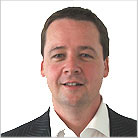 Mark Martin's most recent role was as Group HR Director for Direct Line Insurance Group PLC. Prior to that he was HR Director at RBS Insurance, HR Director at T-Systems UK and HR and Board Director at T-Mobile. During his time at RBS he was responsible for the implementation of seven HR technology systems, including Workday, SuccessFactors and Ceridian.
Mark Martin's most recent role was as Group HR Director for Direct Line Insurance Group PLC. Prior to that he was HR Director at RBS Insurance, HR Director at T-Systems UK and HR and Board Director at T-Mobile. During his time at RBS he was responsible for the implementation of seven HR technology systems, including Workday, SuccessFactors and Ceridian.
1. You talk about a revolution taking place in HR at the moment. What exactly is this revolution and why has it come about?
All successful companies have a strong ‘spine’. They understand who their customers are, they understand what those companies need them to be brilliant at, they have built the capability (systems and people) to be brilliant at that and they have people engaged in/wanting to be brilliant at that. If you are not succeeding you have to change who you think your customers are, what you have to be brilliant at, invest in new technology to build capability OR you have to change your people capability or their engagement. Therefore 60% of your strategic options have always been people-dependent. So people actually are our most important asset but the low status of HR in most organisations is just one indicator that this is not the reality in most organisations.
However, new technology is both removing the barriers to entry and providing much better MI that is starting to reveal this reality, it is starting to be more obvious to the business leaders that people really do matter most! This is starting a revolution in ‘people management’ in businesses. BUT the HR profession have to decide whether this is an opportunity or a threat? When people really matter most and 60% of strategic opportunity needs people change, what the HR function does now won’t suffice!! HR must change or be changed! The other primary driver of change is how new technology is giving knowledge, voice and therefore power to the people. They want to matter more as customers and employees and new technology is giving them the opportunity to make this happen.
2. You’ve worked at senior HR level for many multinationals. What are they doing wrong when it comes to talent management?
In most businesses HR is like a swamp land, under-invested in and on the periphery. Every now and again business leaders realise or good HR people make them realise that they must build something, like talent management. When a multinational gives talent management priority and money they do so because they are hurting! They don’t have the right people where they want them. Unfortunately you cannot build quickly on swamp land! You have to first build the foundations, the lack of which caused the ‘crisis’ in the first place. Most multinationals have not even agreed a common definition of ’talent’. Is it just the young ambitious, MBA grad shooting through the business to the top, challenging at every opportunity and making a noise whenever they can?
At the very least they will have a second category of ‘technical’ talent, whatever the business's ‘technology’ is. Another key foundation is a common understanding of how you define a job and how you define good performance. Somebody who is talented will be able to do what you need and do it well. If you don’t know what that is how can you know the ‘talent’ that will deliver it? Without these and other foundations in place ’talent management’ will always fail. It does not matter how good the system is, once built it will eventually sink into the swamp.
3. You’ve got significant experience of HRIS implementation, including the latest suites such as Workday. What tips would you give to HRDs going through the implementation process?
You thought the last two answers were long! There are many things I learned and many scars as a result! The most important one is for the HRD to OWN the implementation. If you don’t know enough about the systems you are implementing, learn them! If you don’t know how your HR processes work now or are meant to work after implementation you must learn them. Know your stuff! If your implementation impacts the business you must know the ‘what’, the ‘how’ and the ‘why’! If it doesn’t make a noticeable impact you must know why you are doing it.
The second tip is manage expectations. New HRIS does not mean ‘new HR’, it is not magic. If everything is important nothing gets done well! At DLG we hoped for many things from the new HRIS but we promised just three things initially – we would be able to operate HR independently from RBS by the 1st June [part of Mark's job was helping to 'spin off' RBS Insurance from the parent company], we would have everyone paid on the new contracts and T&Cs and we would pay them correctly! Final tip, don’t accept everything the ‘techies’ tell you. You have to be close enough to know the difference between playing safe and a genuine crisis. Push them to do the impossible, the best ’techies’ love to be pushed to do the ‘impossible’. Even I felt unreasonable at times BUT my ‘techie’ team never failed me!
4. What tips would you give to HRDs trying to select the most suitable HR technology vendor?
Don’t buy your own bespoke system! Buy a multi-tenant SaaS system that has the configurability to meet your needs. Only buy from a core HCM vendor, who have developed the core HCM and then built the sexy stuff on top. Don’t buy from a vendor that had success with a ‘sexy’ system and has now built on the core HCM. In particular make sure it will work with the payroll system you have or has a proven payroll capability. Once payroll goes wrong you are in trouble. Buy for the future not from the past – object orientated systems, highly mobile and with a strong customer community that is shaping new releases. Finally, manage your own expectations. Most HR systems are not used and are not liked in the business. Focus on the basics, focus on usability and focus on the needs of your line managers and your people NOT sexy HR stuff. If your new HRIS makes the lives of your line managers easier you will be a hero!
5. What skills do you think are most lacking in HR departments in 2014?
Finally an easy question. HR lack the commercial understanding and involvement (how the business works), they lack financial understanding (the balance sheet, the P&L, the investment drivers, the budget etc) and finally they lack the IS or IT understanding. Systems are the answer to all of HR's dreams. Technology is a steam train coming right at HR, either get on the train or get out the way!
6. Part of your time at RBS included building a new HR function. What lessons did you learn from this?
The typical HR function is built for the past. A function on the periphery with systems that don’t work or are not used. I had to build an HR function the business will want when it has transitioned to the new world. You have to put in the function it wants before it knows it wants it. They want the walking stick to support them until they have learnt to walk BUT they will never learn to walk until you throw the walking stick away! The future is about self-service and line management doing HR, with HR business partners involved in the business and the strategy and the rest of HR as logistics/operations/service, ‘strategic consultants’ (e.g. Reward) and technology support/enablers.
7. What do you think will define the HR department of 2020?
HR will be digital – people will manage themselves and line managers will manage what's left. HR is a small strategy function as I describe above. Bigger and better generalist ‘HR’BPs will arrive. Increasingly coming from the line. Focused on making more money by managing the people better or differently. The rest of the much smaller HR function will be rational/logistical operators making the ‘digital machine’ work and sourcing requests for ‘strategic’ help from the line. HR will only ‘push’ on interventions the executive committee has agreed. This may take to 2025+.






